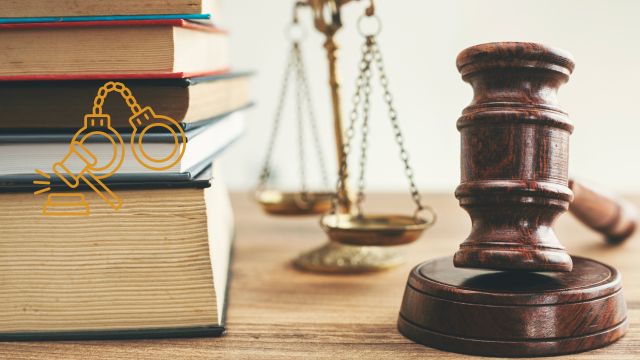The purpose of criminal law is a subject that people have pondered for generations. In fact, there exists an entire field of academia, called Jurisprudence, that aims to try and provide an answer to a seemingly simple question! To understand what the purpose of criminal law, we first need to understand the criminal justice system in Australia, and what laws govern our actions. This article will cover these two This article will look to answer what criminal law is, and how its purpose fits into the criminal justice process in Australia.
The criminal justice system in Australia
Criminal law in Australia is a mix of federal and state laws. Each state and territory has its own set of criminal laws, but some laws apply across the entire country. The basic idea in Australia, like in many other places, is that a person is considered innocent until proven guilty. The law covers a wide range of offences, such as murder, assault, theft, fraud, drug offences, sexual offences, and property crimes.
When it comes to criminal liability, two important things are considered: the guilty act (actus reus) and the guilty mind (mens rea). In simpler terms, it means proving that someone committed the crime and had the intention or knowledge to do so. If someone is found guilty, the punishment depends on factors like the seriousness of the criminal conduct, their criminal history, whether there was an intention to commit crimes and any other relevant circumstances. Penalties can vary from fines and community-based orders to imprisonment.
In Australia, the police are responsible for investigating crimes, and prosecutions are usually carried out by the state or federal Director of Public Prosecutions. Criminal trials are held in the appropriate state or federal courts, and the accused person has the right to a lawyer. The prosecution has to prove the charges beyond a reasonable doubt. Serious cases often involve juries, but less serious offences may be decided by a judge alone. Keep in mind that the details and laws can differ slightly between different states and territories. If you need specific legal advice, it’s best to consult with a qualified legal professional who is familiar with Australian law.
Where are the criminal laws in Australia?
In New South Wales, there is not a single penal law. Instead, several different pieces of legislation make up the criminal code. criminal law is primarily governed by the Crimes Act 1900(NSW). This comprehensive legislation covers a wide range of offences, including crimes against the person, property offences, drug offences, and public order offences. It defines what it means to commit crimes. offences such as murder, assault, theft, and drug-related offences, sexual offences involving children, and establishes penalties based on the severity of the crime. The Act is regularly updated to reflect changes in society and to address emerging issues. It’s important to consult the most recent version of the Crimes Act 1900 (NSW) and relevant legislation for accurate and up-to-date information on the criminal code in New South Wales.
Other key pieces of legislation include The Summary Offences Act 1988 (NSW), which involves public order offences such as offensive language and offensive behaviour, and the Drug Misuse and Trafficking Act 1985 (NSW) addresses offences related to the production, possession, sale, and trafficking of illegal drugs. Note that the criminal code differs substantially from Australia’s civil law system which involves civil law and civil penalties.
Speak to a lawyer today
Here at Jameson Law, we know a thing or two about Australia's complex criminal laws. For quality legal care from some of the best professionals in the business, contact Jameson Law today for a consultation. Remember, we are in it to win it!
So, what is the reason for the criminal law?
The purpose of legal justification for criminal law can be broken down into 5 separate areas :
- The maintenance of social order
- Helps seeks justice for victims
- Protects the rights of individuals
-Helps Rehabilitate Offenders and create a more harmonious society
These categories are a summary of what is outlined in Section 3A of the Crimes (Sentencing Procedure) Act 1999 (NSW), which sets out the ‘purposes of punishment’ that a court should consider when sentencing an offender. Each of these reasons will now be looked at individually.
The maintenance of social order
Criminal law plays a vital role in keeping things in order within a society. It does this by clearly defining what behaviours are considered harmful or disruptive and making them off-limits. By doing so, it sets boundaries and discourages people from committing crimes themselves or helping to aid criminal activity. On the whole, this makes the community a safer and more predictable place.
Another way criminal law helps maintain social order is by holding individuals accountable for their actions. When someone breaks the law, the criminal law ensures they face appropriate consequences. This helps restore a sense of balance and fairness, showing that actions have consequences and that everyone is subject to the same rules. It also reduces the likelihood of people taking justice into their own hands and encourages trust in the legal system.
In a nutshell, criminal law helps maintain social order by defining what’s right and wrong, discouraging criminal behaviour, and ensuring that individuals are held responsible for their actions. It sets the standards for acceptable behaviour and creates a sense of fairness and justice within the community.
Deterring Future Crimes
Criminal law and deterrence go hand in hand when it comes to preventing crime. Deterrence theory suggests that if people know they will face punishment for committing a crime, they’ll be less likely to do it. Criminal law incorporates this idea by having clear rules and punishments for specific offences. Deterrence can be broken down into both General and Specific deterrence.
For deterrence to work, a few things are important. First, the punishment needs to be proportionate to the seriousness of the crime. This means that more severe offences should have harsher penalties. Second, there should be a good chance of getting caught and punished. If people believe they can easily get away with a crime, they’re less likely to be deterred. Lastly, the consequences of an offence committed and breaking the law should be seen as more negative than the potential benefits of committing a crime. This means that the punishment should outweigh any potential gain from the criminal act. If you feel you have been wrongfully convicted for any crime at all, reach out to Jameson Law today for all of your legal needs!
General Deterrence
General deterrence is when potential criminals see the punishment given to someone else for committing a crime and decide not to do it themselves. It works on the idea that when people see others facing serious consequences for breaking the law, they’ll be scared of getting caught and punished too. The theory assumes that this fear will make them think twice before engaging in criminal behaviour because they know the potential negative outcomes if they choose to break the law. So, setting an example through punishments aims to discourage people from committing crimes.
An example of General deterrence would be Drink-Driving in NSW. When it comes to sentencing people for Drink Driving, especially for Mid-Range and High-Range offences, the courts in NSW have a pretty similar approach to criminal procedure. It’s rare for someone to get away without having a conviction recorded or getting their license disqualified unless there are some exceptional circumstances involved.
Specific Deterrence
Specific deterrence focuses more on convicted offenders who have already committed a crime. During a criminal procedure, a trial judge is more likely to try a criminal case with someone who’s already committed an offence more severely. The idea is that when they face consequences like fines or imprisonment, it will make them think twice about repeating their actions in the future. By experiencing the negative outcomes of punishment, they will weigh the pros and cons and be discouraged from engaging in criminal behaviour because they don’t want to go through those undesirable consequences again. In these instances, the offender is more likely to receive a harsher penalty or the maximum sentence, as the judge will deem this to be the appropriate sentence to help protect society.
It’s important to remember that deterrence is not the only factor that influences people’s behaviour. Things like personal circumstances, emotions, and other social factors also play a role. So, while criminal law and deterrence can help prevent crime by setting clear rules and punishments, they’re just part of a larger picture that includes education, addressing social issues, and promoting positive alternatives to criminal behaviour.
Protecting the Rights of Individuals
Criminal law helps to protect individual rights in a few important ways. The criminal procedure follows the principle of “innocent until proven guilty,” meaning that individuals are considered innocent unless there is solid evidence proving their guilt. Secondly, everyone has the right to a lawyer who can defend them and make sure their rights are respected during the legal process. Fair trials are a key part of this, ensuring that procedures are followed correctly and that individuals have a chance to present their cases and cross-examine witnesses.
Another important protection is the right against self-incrimination, meaning that individuals cannot be forced to say things that could be used against them. Lastly, the appellate process allows for the review of decisions made in lower courts, providing an opportunity to correct any mistakes or injustices that may have occurred. Overall, criminal law strives to uphold individual rights and ensure a fair and just process for all involved.
More than just that, criminal law helps protects the rights of those who might be unable to protect their rights themselves. This specifically could apply to minors and protect them from sexual offences. As the Australian Law Reform Commission has noted, court rulings have the protective role of criminal law. The South Australian sentencing legislation, for example, has said that the criminal law includes protecting the safety of the community[135]—in particular, children—from sexual predators by ensuring that, in any sentence for an offence involving sexual exploitation of a child, paramount consideration is given to the need for deterrence. This means that the court held that the appropriate sentence should be harsh – close to the maximum penalty – to make sure no further offending occurs.
Helping seek justice for victims
Criminal law and seeking justice for victims go hand in hand. Criminal law sets the rules and procedures to pursue justice when someone becomes a victim of a crime. It defines what actions are considered crimes, gives power to law enforcement to investigate, and allows prosecutors to bring offenders to trial. Through criminal law, offenders can be held accountable, and justice can be sought for the victims. The law also ensures that the legal process is fair and gives victims a chance to participate, allowing their voices to be heard. This follows key common law principles and is similar to what occurs in other European countries as well. common law principles, a police officer, and rehabilitation programs to function smoothly together.
Rehabilitation of Offenders
Criminal law not only focuses on punishment but also recognizes the importance of rehabilitation for offenders. Rehabilitation is the process of helping individuals who have committed crimes to reintegrate into society, address the underlying causes of their criminal behaviour, and become law-abiding citizens. Criminal law plays a significant role in facilitating rehabilitation by offering various programs and opportunities for offenders to transform their lives.
Within the criminal justice system, rehabilitation can take different forms. For example, probation or community-based sentences allow offenders to remain in the community under certain conditions while receiving counselling, treatment, or educational programs. These alternatives to incarceration aim to provide support and guidance, helping offenders develop skills, address substance abuse issues, or access mental health services. By offering rehabilitative options, criminal law seeks to address the root causes of criminal behaviour and provide offenders with a chance to reintegrate into society as law-abiding individuals. Through rehabilitation, the criminal justice system aims to break the cycle of crime and promote long-term positive change for both individuals and communities.

 (02) 8806 0866
(02) 8806 0866





